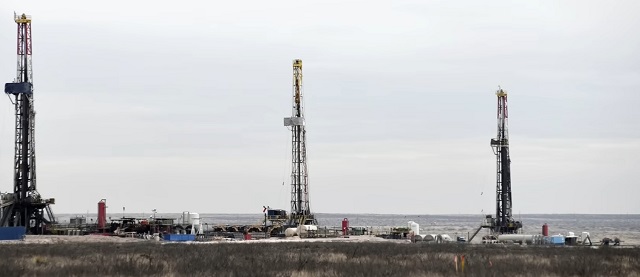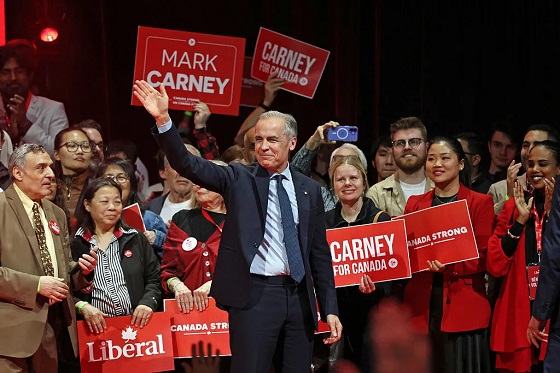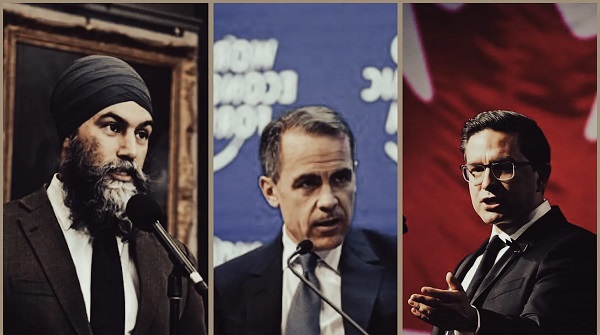Energy
Energy Companies May Be On Cusp Of Uncorking Next Massive Oil, Gas Boon

 From the Daily Caller News Foundation
From the Daily Caller News Foundation
These companies, all run by smart business people, continue to invest many billions of capital dollars in these risky, long-term projects even as “experts” like the bureaucrats at the International Energy Agency (IEA) continue to predict demand for crude oil is about to peak in the next few years.
Constantly advancing technology has always been the driver behind the advance of the oil-and-gas industry since the first successful U.S. well was drilled by Edwin Drake near Titusville, Pennsylvania, in 1859. The Drake well was drilled to a then unheard-of depth of 69 feet using the most primitive equipment imaginable.
This week, 165 years later, U.S. oil giant Chevron announced it had achieved first production in its Anchor field in the Gulf of Mexico. At its shallow depth, underground pressure in the Drake well would have been negligible, just enough to force the oil up out of the ground. The Anchor semi-submersible floating production unit (FPU) that was started up by Chevron this week enables the capture of massive volumes of oil and natural gas from underground formations up to 34,000 feet below sea level at pressures up to 20,000 pounds per square inch.
“The Anchor project represents a breakthrough for the energy industry,” said Nigel Hearne, executive vice president, Chevron Oil, Products & Gas. “Application of this industry-first deepwater technology allows us to unlock previously difficult-to-access resources and will enable similar deepwater high-pressure developments for the industry.”
Chevron says seven deepwater wells will be tied into the Anchor FPU, which has the capacity to capture, process and transport as much as 75,000 barrels of oil and 28 million cubic feet of natural gas every day. The company estimates reserves in the field of 440 million barrels of oil equivalent with current technology. But, again, the technology deployed by the industry advances every day, meaning a far bigger amount of oil and gas will ultimately be recovered over the coming years.
Other major oil companies, like BP, are also beginning to deploy similar high-pressure technology that they and analysts believe will help them tap into billions of new barrels known to exist in deep, high-pressure formations in various parts of the world. Globally, BP says it believes deployment of advanced technology could help it access up to 10 billion barrels of known high pressure reserves.
Reuters quotes Wood Mackenzie principal analyst Mfon Usoro as saying the new high pressure technologies could enable companies like BP and Chevron to unlock as much as 2 billion barrels of known reserves in the Gulf of Mexico alone. “The industry has done their bit to safely deliver the barrels, with the new technology,” she said, adding: “These ultra-high-pressure fields are going to be a big driver for production growth in the Gulf of Mexico.”
On the same day Chevron made its announcement, Chinese national oil company CNOOC announced the completion of what it believes is the largest offshore platform on Earth, the Marjan facility. The giant platform, which serves similar functionality as the Anchor FPO, will now be shipped 6,400 nautical miles to the Persian Gulf, where it will facilitate the full development of Saudi Arabia’s deepwater Marjan Field.
It is important to keep in mind that the mounting of these massive offshore facilities and drilling of the deepwater wells are all long-term, multi-billion-dollar projects. These are facilities designed to handle the production from these deepwater fields for decades, not just a few years until the vaunted energy transition takes away all the demand for the commodities being produced.
In addition to the projects in the Gulf of Mexico and Persian Gulf, all the companies mentioned here are involved in aggressive efforts to discover and produce oil and gas in deepwater regions around the world. CNOOC, for example, is a 20% owner in the prolific Stabroek block development offshore of Guyana operated by ExxonMobil. Chevron stands to become a 30% owner in that same development via its proposed buyout of Houston-based Hess Corp.
These companies, all run by smart business people, continue to invest many billions of capital dollars in these risky, long-term projects even as “experts” like the bureaucrats at the International Energy Agency (IEA) continue to predict demand for crude oil is about to peak in the next few years. Meanwhile, OPEC says it believes demand for crude will keep rising through at least 2045, perhaps longer.
Someone will be right, and someone will be wrong. Regardless, we can rest assured that advancing technology in the industry itself will ensure there will be no shortage of supply.
David Blackmon is an energy writer and consultant based in Texas. He spent 40 years in the oil and gas business, where he specialized in public policy and communications.
Featured image credit: (Screen Capture/PBS NewsHour)
Alberta
It’s On! Alberta Challenging Liberals Unconstitutional and Destructive Net-Zero Legislation

“If Ottawa had it’s way Albertans would be left to freeze in the dark”
The ineffective federal net-zero electricity regulations will not reduce emissions or benefit Albertans but will increase costs and lead to supply shortages.
The risk of power outages during a hot summer or the depths of harsh winter cold snaps, are not unrealistic outcomes if these regulations are implemented. According to the Alberta Electric System Operator’s analysis, the regulations in question would make Alberta’s electricity system more than 100 times less reliable than the province’s supply adequacy standard. Albertans expect their electricity to remain affordable and reliable, but implementation of these regulations could increase costs by a staggering 35 per cent.
Canada’s constitution is clear. Provinces have exclusive jurisdiction over the development, conservation and management of sites and facilities in the province for the generation and production of electrical energy. That is why Alberta’s government is referring the constitutionality of the federal government’s recent net-zero electricity regulations to the Court of Appeal of Alberta.
“The federal government refused to work collaboratively or listen to Canadians while developing these regulations. The results are ineffective, unachievable and irresponsible, and place Albertans’ livelihoods – and more importantly, lives – at significant risk. Our government will not accept unconstitutional net-zero regulations that leave Albertans vulnerable to blackouts in the middle of summer and winter when they need electricity the most.”
“The introduction of the Clean Electricity Regulations in Alberta by the federal government is another example of dangerous federal overreach. These regulations will create unpredictable power outages in the months when Albertans need reliable energy the most. They will also cause power prices to soar in Alberta, which will hit our vulnerable the hardest.”
Finalized in December 2024, the federal electricity regulations impose strict carbon limits on fossil fuel power, in an attempt to force a net-zero grid, an unachievable target given current technology and infrastructure. The reliance on unproven technologies makes it almost impossible to operate natural gas plants without costly upgrades, threatening investment, grid reliability, and Alberta’s energy security.
“Ottawa’s electricity regulations will leave Albertans in the dark. They aren’t about reducing emissions – they are unconstitutional, ideological activist policies based on standards that can’t be met and technology that doesn’t exist. It will drive away investment and punish businesses, provinces and families for using natural gas for reliable, dispatchable power. We will not put families at risk from safety and affordability impacts – rationing power during the coldest days of the year – and we will continue to stand up for Albertans.”
“Albertans depend on electricity to provide for their families, power their businesses and pursue their dreams. The federal government’s Clean Electricity Regulations threaten both the affordability and reliability of our power grid, and we will not stand by as these regulations put the well-being of Albertans at risk.”
Related information
- Conference Board of Canada socio-economic Impacts of Canada’s 2030 Emissions Reduction Plan – (April 2025)
- Alberta Electric System Operator’s position on Canadian Energy Regulations
Alberta
Alberta’s future in Canada depends on Carney’s greatest fear: Trump or Climate Change

Oh, Canada
We find it endlessly fascinating that most Canadians believe they live in a representative democracy, where aspiring candidates engage in authentic politicking to earn their place in office. So accustomed are Canada’s power brokers to getting their way, they rarely bother to cover their tracks. A careful reading of the notoriously pliant Canadian press makes anticipating future events in the country surprisingly straightforward.
Back in December, when Pierre Poilievre was given better than 90% odds of replacing Prime Minister Justin Trudeau—and Mark Carney was still just an uncharismatic banker few had heard of—we engaged in some not-so-speculative dot-connecting and correctly predicted Carney’s rise to the top spot. Our interest was driven by the notoriously rocky relationship between Ottawa and the Province of Alberta, home to one of the world’s largest hydrocarbon reserves, and how Carney’s rise might be a catalyst for resetting Canada’s energy trajectory. In a follow-up article titled “The Fix Is In,” we laid out a few more predictions:
“Here’s how the play is likely to unfold in the weeks and months ahead: Carney will be elected Prime Minister on April 28 by a comfortable margin; [Alberta Premier Danielle] Smith will trigger a constitutional crisis, providing cover for Carney to strike a grand bargain that finally resolves longstanding tensions between the provinces and Ottawa; and large infrastructure permitting reform will fall into place. Protests against these developments will be surprisingly muted, and those who do take to the streets will be largely ignored by the media. The entire effort will be wrapped in a thicket of patriotism, with Trump portrayed as a threat even greater than climate change itself. References to carbon emissions will slowly fade…
In parallel, we expect Trump and Carney to swiftly strike a favorable deal on tariffs, padding the latter’s bona fides just as his political capital will be most needed.”
The votes have barely been counted, yet the next moves are already unfolding…
“Alberta Premier Danielle Smith says she’ll make it easier for citizens to initiate a referendum on the province’s future in Canada, after warning that a Liberal win in Monday’s election could spur a groundswell of support for Alberta separatism. Smith said on Tuesday that a newly tabled elections bill will give everyday Albertans a bigger say in the province’s affairs.
‘(We’re giving) Albertans more ways to be directly involved in democracy, and to have their say on issues that matter to them,’ Smith told reporters in Edmonton.
If passed, the new law would dramatically lower the number of signatures needed to put a citizen-proposed constitutional referendum question on the ballot, setting a new threshold of 10 per cent of general election turnout — or just over 175,000, based on Alberta’s last provincial election in 2023.”
“US President Donald Trump said on Wednesday that Canadian Prime Minister Mark Carney is looking to make a trade deal and will visit the White House within the next week. Trump said he congratulated Carney on his election victory when the Canadian leader called on Tuesday.
‘He called me up yesterday – he said let’s make a deal,’ Trump told reporters at the White House after a televised Cabinet meeting.”
Remember where you read it first.
-

 2025 Federal Election1 day ago
2025 Federal Election1 day agoNDP Floor Crossers May Give Carney A Majority
-

 Alberta8 hours ago
Alberta8 hours agoIt’s On! Alberta Challenging Liberals Unconstitutional and Destructive Net-Zero Legislation
-

 Alberta2 days ago
Alberta2 days agoPremier Danielle Smith hints Alberta may begin ‘path’ toward greater autonomy after Mark Carney’s win
-

 Business1 day ago
Business1 day agoChina’s economy takes a hit as factories experience sharp decline in orders following Trump tariffs
-

 Automotive1 day ago
Automotive1 day agoNew federal government should pull the plug on Canada’s EV revolution
-

 Business1 day ago
Business1 day agoScott Bessent says U.S., Ukraine “ready to sign” rare earths deal
-

 Alberta1 day ago
Alberta1 day agoPreston Manning: Canada is in a unity crisis
-

 Mental Health1 day ago
Mental Health1 day agoHeadline that reads ‘Ontario must pay for surgery to give trans resident both penis and vagina: appeal court’ a sign of the times in Canada




